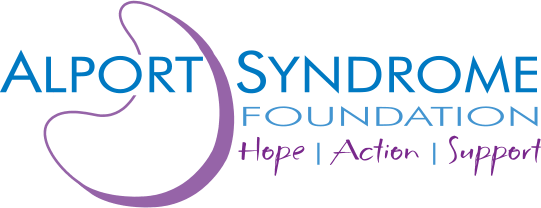We need your help! People living with Alport syndrome can advance critical research that will help everyone with our rare disease.
Need help deciding if research participation is right for you? The Office for Human Research Protections (within the United States Department of Health and Human Services) has educational documents in English and in Spanish outlining “Questions to Ask When Deciding Whether to Volunteer for Research.”
Here are a few ways patients can get actively involved in ongoing research projects:
1
Join the ASF Alport Patient Registry
Alport Syndrome Foundation’s patient registry for individuals of all ages with Alport syndrome is active and currently enrolling patients in the U.S. (and U.S. territories/islands)!
Click here to learn more, enroll, and help advance critical Alport syndrome research.
2
Enroll in NEPTUNE (Natural History Study)
Alport Syndrome Foundation has partnered with NEPTUNE, the Nephrotic Syndrome Study Network at the University of Michigan, to launch a natural history in Alport syndrome. This natural history study aims to recruit up to 63 Alport patients with diverse genetic mutations for a period of three years in total. The study will include collection of biosamples, including blood, urine, and kidney biopsy tissue (not required), as well as clinical data such as blood pressure readings, hearing measurements, family history etc. Study site locations are available across the U.S., and travel stipends and reimbursements are part of the study plan.
To learn more about NEPTUNE and be connected with a site near you, visit NEPTUNE’s website, or directly contact Chrysta Lienczewski ([email protected]) or ASF ([email protected]).
3
Human Gene Modifier Data Study
Dr. Laith Al-Rabadi, a clinician and researcher at The University of Utah, and member of ASF’s Medical Advisory Committee, is currently using whole exome sequencing to further understanding of modifier genes in humans. A salvia sample, kidney lab results, and other clinical information is all that is required to participate at no cost to you and can all be completed from your home with no travel. . Click here for a document with further details about this ongoing study.
Patients interested in assisting Dr. Al-Rabadi can contact study coordinator Autumn Wilcox at [email protected].
4
Share Your Diagnosis Story
Alport syndrome is commonly misdiagnosed. In an effort to more clearly understand why, under the guidance of our Medical Advisory Committee, we have developed multiple choice and free response questions allowing patients to share their diagnosis stories. This ongoing survey project began in early 2021 — if you’ve already participated, thank you! We only need you to submit answers once.
5
Assist In Laboratory Research From Your Own Home
Dr. Ron Korstanje, a genetics researcher at The Jackson Laboratory in Bar Harbor, Maine, and member of ASF’s Scientific Advisory Research Network (SARN), needs help with a citizen science project. It’s a pretty simple task that involves viewing tissue slide images of kidneys from Alport mouse models. This can be done from your own computer/laptop/tablet at home. There is no hard deadline for this project and ASF Staff can help you get started.
If interested, email ASF to receive the instructions you need to virtually participate.
6
Participate in Non-Invasive Pregnancy Research
Are you or your partner pregnant? Does Alport syndrome run in your family?
Dr. Laura Perin of Children’s Hospital Los Angeles (and ASF’s SARN) is interested in connecting with you about her research. Dr. Perin was the recipient of the first-ever $100,000 ASF research grant in 2011. As of March 2022, ten expecting mothers across the U.S. have kindly agreed to donate their amniotic fluid for Dr. Perin’s groundbreaking new Alport research. The collection of amniotic fluid poses no risk for mother or baby since it is collected during delivery (no procedure is necessary). Personal information is not shared and the mother’s and baby’s names are de-identified in all research reports.
If you would like to learn more, contact Dr. Laura Perin at [email protected].
7
Help Advance Alport syndrome Eye Research
Dr. Laith Al-Rabadi, a clinician and researcher at The University of Utah, and member of ASF’s Medical Advisory Committee, is participating in collaborative research with retinal expert Dr. Paul Bernstein (University of Utah Health). As part of the Utah Kindred P study, an Alport patient eye exam and ocular coherence tomography (OCT) are covered by a grant from National Kidney Foundation. The goal will be to study ophthalmologic findings and assess retinal thickness and noninvasive tests to diagnose Alport syndrome. Patients do not need to have experienced eye abnormalities to participate in this study. All types of Alport patients are welcome and will help further the study.
If you would like to learn more about this eye examination, contact Dr. Al-Rabadi at [email protected].
8
Pediatric Surveys + Zoom Events
Alport syndrome patients ages 13-22 are invited to participate in an important ASF project. The “Pediatric Alport Patient Insight Campaign” is currently being developed as a resource for pediatric nephrologists and Alport families. Over two dozen young Alport patients are currently contributing their Alport stories via a series of surveys and Zoom gatherings.
Click here to learn more about this ongoing research opportunity.
9
Hearing Loss Research: Consider Advance Plans for Anatomical Gifts
The human inner ear is inaccessible in life. Therefore, the study of donated ear specimens is critical to the understanding of hearing loss. Follow the link below learn more about the National Temporal Bone Registry and how to make advance plans for anatomical gifts.
Click here to learn more about advancing hearing loss research.
